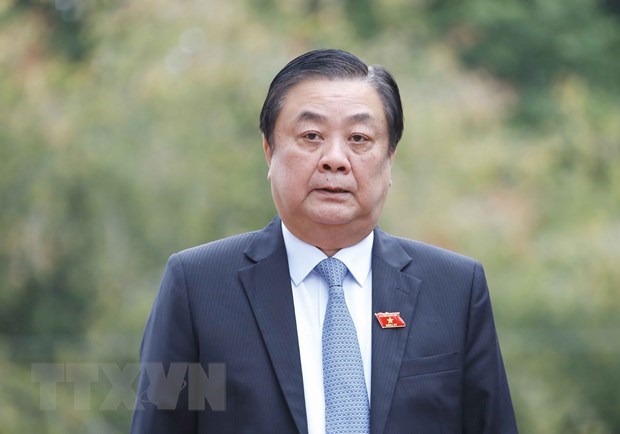.jfif) Opinion
Opinion


|
| Minister of Agriculture and Rural Development Lê Minh Hoan. VNA/VNS Photo |
Minister of Agriculture and Rural Development Lê Minh Hoan spoke to Vietnam News Agency about the sector’s achievements in 2021 and future orientations.
Looking back at a year when the agricultural sector was affected by not only weather, natural disasters but also the COVID-19 pandemic, how do you assess its achievements?
In March 2021, when the pandemic was evolving complicatedly in southern localities where the country’s major agricultural and industrial centres are located, the production and transportation of farm produce were disrupted. The processing and distribution were also suspended.
The export market faced numerous challenges which we overcame, thus targets were met.
This has shown the flexibility and adaptability of the sectoral management system from the central level to local level, of the business community, associations and farmers. This has also demonstrated the connection between sectors and businesses to stabilise the market and quickly recover by the end of the year.
We are proud that when tens of millions of people were put in quarantine, food was still delivered to every house. Some places, at some times, faced difficulties but we always made sure we have enough food.
Special working groups of the Ministry of Agriculture and Rural Development helped farmers sell products and offered support to businesses to have raw materials for processing when localities imposed different regulations on social distancing.
Thanks to the coordinating role of the ministry's working groups, the cooperation with relevant ministries and sectors, the agricultural sector in 2021 exceeded the targets, which shows great efforts of all people. It once again affirmed the supporting role of the agricultural sector when the country falls into difficulties.
COVID-19 imposed adverse impacts and also showed us the sector’s shortcomings. What should be improved to develop the sector and help farmers earn success when they face non-traditional challenges?
We must put scenarios into our plans to be able to adapt. Without the pandemic, the market still basically keeps changing.
Take the supply chain for example, the problem is not ramping up production, but we need to identify the market size to adjust production. The supply chain must be ensured by the logistics system in the agricultural sector.
We often say logistics is about export. But with a market of 100 million people in the country, the supply chain for the domestic market needs more investment, not only in production, but also warehousing system and product classifying and processing facilities. In case the supply chain is disrupted, we will have places to create higher values from the inland to the border gate.
To ensure the global supply chain, first of all, we must ensure the domestic supply chain. Therefore, in the Government's economic recovery programme, the agricultural ministry proposed and got approval from the Government to invest in the agricultural supply chain and logistics to both ensure the foundation of the domestic market and participate in exports more actively.
Digital transformation in agriculture is building a supply and demand database.
Through that database, the Ministry of Agriculture and Rural Development will promote its role of coordinating and organising production. This is what we learned after the pandemic.
What we have seen is shortcomings of the agricultural industry in the pandemic. Market instability will continue due to many impacts. Therefore, the scenario of flexible adaptation and timely coordination in each period requires a more dynamic industry apparatus, not just a perfect plan. I believe that flexibility and adaptability are the keys to success.
What are the ministry's plans in 2022 to maintain achievements in the context of global and domestic difficulties?
There is one word that can describe 2021: changes. That is climate change, market fluctuations and changes in world consumption trends.
When facing changes, Vietnamese people are very flexible and dynamic to adapt.
Changes help us realise what the advantages and disadvantages are.
Thanks to COVID-19, we have realised our strength and weaknesses and made adjustments. I am very happy that in 2021 the staff of the agricultural sector reviewed and changed their mind.
First, the sector will shift from the mindset of agricultural production to agricultural economics. It is possible that when switching to this, a certain industry’s ranking may be reduced but it will bring higher added values and higher real income for farmers.
We must solve the paradoxical problem that the growth rate of the agricultural sector is not consistent with the income of farmers.
This will be the problem that will be addressed in the Strategy for Sustainable Agriculture and Rural Development for the period 2021-30, with a vision to 2050.
In 2022, the agricultural sector will launch programmes such as building new-style rural areas to reduce poverty. The national target programme on building new-style rural areas in the coming period not only focuses on infrastructure investment such as roads, bridges, irrigation infrastructure but on rural economic infrastructure, developing rural economics from cooperatives, rural tourism, one product one commune.
The sector looks to a future that farmers can take part in the production chain to replace businesses so that farmers can not only earn from the products they make, but also create added value from raw materials to semi-processed products. That is the direction of new-style rural areas. — VNS